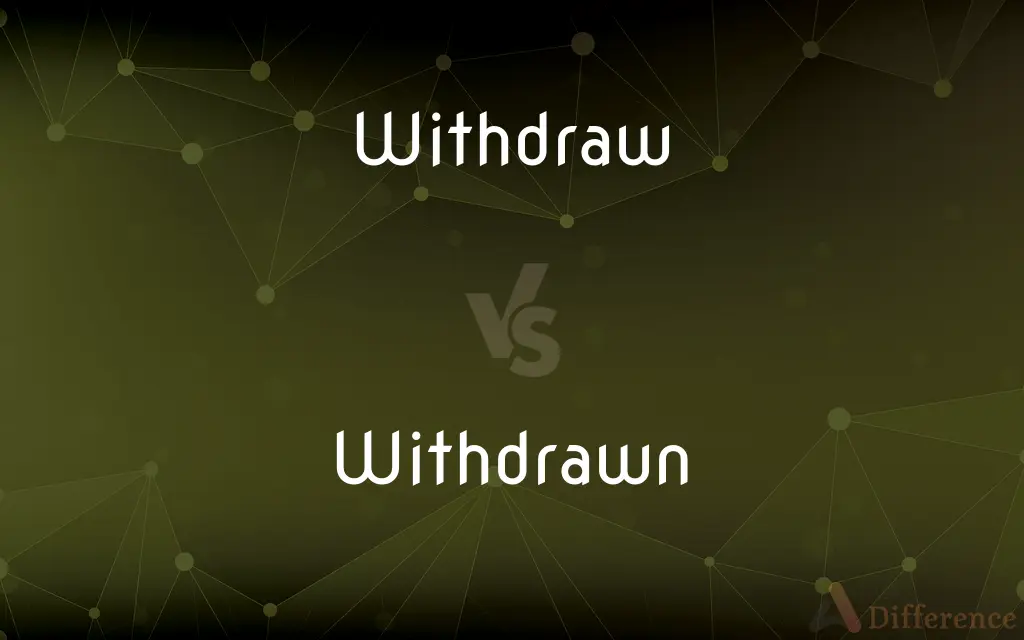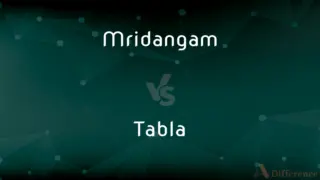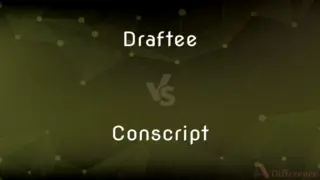Withdraw vs. Withdrawn — What's the Difference?
Edited by Tayyaba Rehman — By Urooj Arif — Updated on April 2, 2024
Withdraw means to remove oneself or something from a situation, while withdrawn refers to a state of being removed or detached, often describing a person's demeanor.

Difference Between Withdraw and Withdrawn
Table of Contents
ADVERTISEMENT
Key Differences
Withdraw involves an action or process of pulling back or removing oneself or something from a particular place or situation. This can be in a physical sense, like withdrawing money from a bank, or in a metaphorical sense, such as withdrawing from a social event. On the other hand, withdrawn is typically used to describe someone’s personality or current state, indicating that they are not actively engaging with their surroundings or people around them. It implies a more passive or static condition rather than an active process.
When you withdraw from a situation, it signifies an active choice or decision made to leave, disengage, or retract from that specific context. This action can be driven by various motivations, including personal preference, safety concerns, or strategic reasons. Whereas, being described as withdrawn does not necessarily imply an active choice; it can be the result of inherent personality traits, experiences, or emotional states that cause an individual to retreat inwardly and maintain a distance from external interactions.
Withdrawal can be temporary or permanent based on the context and intention behind the action. For instance, withdrawing a proposal can be a strategic move that may be reversed in the future. Conversely, a person characterized as withdrawn might exhibit a consistent pattern of behavior over time, which can be perceived as a more permanent aspect of their personality, unless they choose or manage to alter this trait.
The act of withdrawing often requires a deliberate effort or action to remove oneself or something from a place, position, or consideration. This implies a transition from being present or engaged to being absent or disengaged. Meanwhile, someone who is withdrawn may not necessarily have made a conscious decision to disengage from social interactions; it could be a natural disposition or a reaction to external factors, illustrating a difference in agency between the two terms.
Withdraw can be applied in a wide range of contexts, including financial transactions, social situations, and even in the context of formal agreements or competitions. This versatility shows the term's dynamic nature and its relevance to various aspects of life. Withdrawn, in contrast, is more commonly used in psychological and social contexts to describe a person’s temperament or social engagement level, highlighting its more focused and specific application.
ADVERTISEMENT
Comparison Chart
Definition
The act of removing oneself or something from a situation.
A state or condition of being detached or distanced from others.
Usage
Verb (action)
Adjective (describes a state)
Contexts
Financial, social, formal agreements, competitions.
Psychological, social interactions, personality description.
Implication of Choice
Implies a deliberate action or decision.
May not imply a choice; often describes a natural disposition or reaction.
Temporal Nature
Can be temporary or permanent based on context.
Often seen as a more permanent trait or condition.
Compare with Definitions
Withdraw
To leave a place or situation.
He withdrew from the party early due to feeling unwell.
Withdrawn
Not participating in social activities.
The child was quiet and withdrawn at school.
Withdraw
To remove money from a bank account.
She withdrew $200 from her savings account for emergency expenses.
Withdrawn
Detached from one's surroundings.
The withdrawn cat hid under the bed whenever guests arrived.
Withdraw
To take back or remove.
She decided to withdraw her application from the job pool.
Withdrawn
Reflecting introspection or inner focus.
His withdrawn demeanor made it hard to guess what he was thinking.
Withdraw
To retract a statement or accusation.
Under pressure, the politician was forced to withdraw his controversial statement.
Withdrawn
Not communicative or expressive.
She noticed that her friend was unusually withdrawn during the conversation.
Withdraw
To stop participating in an activity.
The team had to withdraw from the competition because of injuries.
Withdrawn
Showing a desire to be alone.
After the incident, he became more withdrawn and spent a lot of time by himself.
Withdraw
Remove or take away (something) from a particular place or position
She prised open the lid and withdrew a slim diamond ring
Ruth withdrew her hand from his
Withdrawn
Past participle of withdraw.
Withdraw
Leave or cause to leave a place or situation
UN forces withdrew from the province
Both countries agreed to withdraw their troops
Withdrawn
Emotionally unresponsive or socially detached; introverted or aloof.
Withdraw
Cease to take an addictive drug
For the cocaine user, it is possible to withdraw without medication
Withdrawn
Removed from circulation
A withdrawn library book
Withdraw
To take back or away; remove
Withdrew his hand from the cookie jar.
Withdrawn
Introverted; not inclined to interact with other people
A withdrawn child
Withdraw
To cause to leave or return
The government withdrew its diplomats from the capital.
Withdrawn
Past participle of withdraw
Withdraw
To remove (money) from an account.
Withdrawn
Withdrawn from society; seeking solitude;
Lived an unsocial reclusive life
Withdraw
To turn away (one's gaze, for example).
Withdrawn
Tending to reserve or introspection;
A quiet indrawn man
Withdraw
To draw aside
Withdrew the curtain.
Withdraw
To remove from consideration or participation
Withdrew her application.
Withdrew his son from the race.
Withdraw
To recall or retract
Withdrew the accusation.
Withdraw
To move or draw back; retire
The lawyers withdrew to the judge's chambers.
Withdraw
To leave or return, as from a military position.
Withdraw
To remove oneself from active participation
Withdrew from the competition.
Withdraw
To become detached from social or emotional involvement
After the snubbing, he withdrew into a shell.
Withdraw
To recall or remove a motion from consideration in parliamentary procedure.
Withdraw
To discontinue the use of a drug or other substance, especially one that is addictive.
Withdraw
To react physiologically and mentally to this discontinuance, often while experiencing distressing symptoms.
Withdraw
(transitive)
Withdraw
To draw or pull (something) away or back from its original position or situation.
Withdraw
To take away or take back (something previously given or permitted); to remove, to retract.
Withdraw
To cause or help (someone) to stop taking an addictive drug or substance; to dry out.
Withdraw
To take (one's eyes) off something; to look away.
Withdraw
(figuratively)
Withdraw
To distract or divert (someone) from a course of action, a goal, etc.
Withdraw
To extract (money) from a bank account or other financial deposit.
Withdraw
(intransitive)
Withdraw
Chiefly followed by from: to leave a place, someone's presence, etc., to go to another room or place.
Withdraw
Chiefly followed by from: to stop taking part in some activity; also, to remove oneself from the company of others, from publicity, etc.
Withdraw
To stop talking to or interacting with other people and start thinking thoughts not related to what is happening.
Withdraw
To stop taking an addictive drug or substance; to undergo withdrawal.
Withdraw
An act of drawing back or removing; a removal, a withdrawal or withdrawing.
Withdraw
(law) withdraught
Withdraw
To take back or away, as what has been bestowed or enjoyed; to draw back; to cause to move away or retire; as, to withdraw aid, favor, capital, or the like.
Impossible it is that God should withdraw his presence from anything.
Withdraw
To take back; to recall or retract; as, to withdraw false charges.
Withdraw
To retire; to retreat; to quit a company or place; to go away; as, he withdrew from the company.
Withdraw
Pull back or move away or backward;
The enemy withdrew
The limo pulled away from the curb
Withdraw
Withdraw from active participation;
He retired from chess
Withdraw
Release from something that holds fast, connects, or entangles;
I want to disengage myself from his influence
Disengage the gears
Withdraw
Cause to be returned;
Recall the defective auto tires
The manufacturer tried to call back the spoilt yoghurt
Withdraw
Take back what one has said;
He swallowed his words
Withdraw
Keep away from others;
He sequestered himself in his study to write a book
Withdraw
Remove something concrete, as by lifting, pushing, taking off, etc. or remove something abstract;
Remove a threat
Remove a wrapper
Remove the dirty dishes from the table
Take the gun from your pocket
This machine withdraws heat from the environment
Withdraw
Break from a meeting or gathering;
We adjourned for lunch
The men retired to the library
Withdraw
Retire gracefully;
He bowed out when he realized he could no longer handle the demands of the chairmanship
Withdraw
Remove (a commodity) from (a supply source);
She drew $2,000 from the account
The doctors drew medical supplies from the hospital's emergency bank
Withdraw
Lose interest;
He retired from life when his wife died
Withdraw
Make a retreat from an earlier commitment or activity;
We'll have to crawfish out from meeting with him
He backed out of his earlier promise
The aggressive investment company pulled in its horns
Common Curiosities
What does it mean to withdraw?
To withdraw means to remove oneself or something from a particular situation or place.
Can 'withdraw' apply to emotional situations?
Yes, one can withdraw emotionally from relationships or interactions, choosing not to engage on a personal level.
Can someone who is withdrawn participate in social activities?
Yes, but they may do so less frequently or enthusiastically than others, often preferring to observe rather than actively engage.
Is it possible to withdraw from an online situation?
Yes, withdrawing from an online situation, like a forum or social media platform, involves ceasing to participate or engage with it.
Can 'withdraw' be used in a financial context?
Yes, it commonly refers to removing money from a bank account or investment.
Is withdrawing a decision?
Yes, withdrawing typically involves making a conscious decision to leave or stop participating in something.
How is 'withdrawn' used to describe a person?
'Withdrawn' describes someone who is not actively engaging with others or their environment, often appearing introspective or distant.
Is being withdrawn always negative?
Not necessarily; it can simply indicate a person's preference for solitude or introspection, though it can sometimes signal emotional distress.
What are some reasons someone might withdraw from a competition?
Reasons can include injury, personal reasons, strategic decisions, or disqualification.
How can someone help a person who is withdrawn?
Offering support, understanding, and patience, while gently encouraging engagement can be helpful.
What does it mean if someone becomes more withdrawn?
It suggests they are increasingly seeking solitude or avoiding social interactions, possibly due to emotional changes or experiences.
Can a business withdraw from a market?
Yes, a business can withdraw from a market by ceasing its operations or sales there, often due to strategic or financial reasons.
What are the effects of being withdrawn on relationships?
It can lead to misunderstandings, distance, or strain in relationships, as others may perceive it as disinterest or aloofness.
Can someone be temporarily withdrawn?
Yes, individuals may show withdrawn behavior temporarily due to specific situations or emotional states.
Is it possible to withdraw consent?
Yes, one can withdraw consent at any time, which means revoking permission for something that was previously agreed upon.
Share Your Discovery

Previous Comparison
Mridangam vs. Tabla
Next Comparison
Draftee vs. ConscriptAuthor Spotlight
Written by
Urooj ArifUrooj is a skilled content writer at Ask Difference, known for her exceptional ability to simplify complex topics into engaging and informative content. With a passion for research and a flair for clear, concise writing, she consistently delivers articles that resonate with our diverse audience.
Edited by
Tayyaba RehmanTayyaba Rehman is a distinguished writer, currently serving as a primary contributor to askdifference.com. As a researcher in semantics and etymology, Tayyaba's passion for the complexity of languages and their distinctions has found a perfect home on the platform. Tayyaba delves into the intricacies of language, distinguishing between commonly confused words and phrases, thereby providing clarity for readers worldwide.
















































